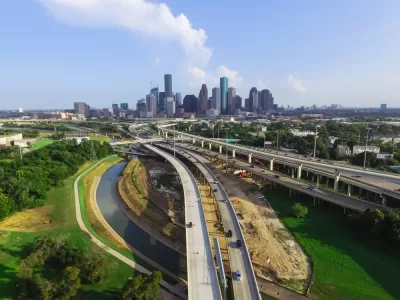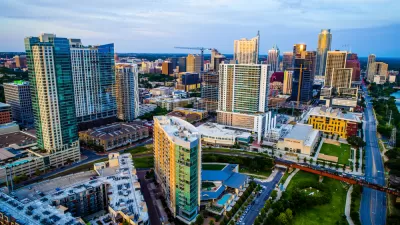Texas Transportation Commissioners must have a hangover—backing off its highway building ambitions just a few months after approving the $85 billion Unified Transportation Plan in August 2022.

Just a few months after approving $85 billion in road building projects as part of a ten-year Unified Transportation Plan approved in August, Texas Transportation Commission officials warned the public that some of the state’s massive highway building plans might have to wait.
“Rising labor and material costs prompted a warning from the Texas Transportation Commission Tuesday that some highway projects could have to wait,” reports Dug Begley in a paywalled article for the Houston Chronicle. Inflation is already pushing the cost of some of the projects in the Unified Transportation Plan by more than 30 percent, according to commissioners and data cited in the article.
“For November the state's highway cost index — which tracks the average cost of materials and labor based on recent bids on construction work — was 31.3 percent higher than it was a year ago and 37.5 percent above November 2019,” writes Begley.
Transportation Commissioner Alvin New is quoted in the article suggesting that there might be a point where the state finally has to say “no” to road building projects. Despite the sudden sobriety on the Texas Transportation Commission, the state did recently decided to move forward with the controversial North Houston Highway Improvement Project to widen Interstate 45 in Houston.
The source article below digs into more detail about the potential risks of building too much, too fast as a response to inflation, and what the state stands to lose if inflation takes a chunk out of the plan.
FULL STORY: TxDOT officials, citing rising costs, predict they will need to say 'no' to some highway projects

Alabama: Trump Terminates Settlements for Black Communities Harmed By Raw Sewage
Trump deemed the landmark civil rights agreement “illegal DEI and environmental justice policy.”

Planetizen Federal Action Tracker
A weekly monitor of how Trump’s orders and actions are impacting planners and planning in America.

The 120 Year Old Tiny Home Villages That Sheltered San Francisco’s Earthquake Refugees
More than a century ago, San Francisco mobilized to house thousands of residents displaced by the 1906 earthquake. Could their strategy offer a model for the present?

Opinion: California’s SB 79 Would Improve Housing Affordability and Transit Access
A proposed bill would legalize transit-oriented development statewide.

Record Temperatures Prompt Push for Environmental Justice Bills
Nevada legislators are proposing laws that would mandate heat mitigation measures to protect residents from the impacts of extreme heat.

Downtown Pittsburgh Set to Gain 1,300 New Housing Units
Pittsburgh’s office buildings, many of which date back to the early 20th century, are prime candidates for conversion to housing.
Urban Design for Planners 1: Software Tools
This six-course series explores essential urban design concepts using open source software and equips planners with the tools they need to participate fully in the urban design process.
Planning for Universal Design
Learn the tools for implementing Universal Design in planning regulations.
Clanton & Associates, Inc.
Jessamine County Fiscal Court
Institute for Housing and Urban Development Studies (IHS)
City of Grandview
Harvard GSD Executive Education
Toledo-Lucas County Plan Commissions
Salt Lake City
NYU Wagner Graduate School of Public Service




























